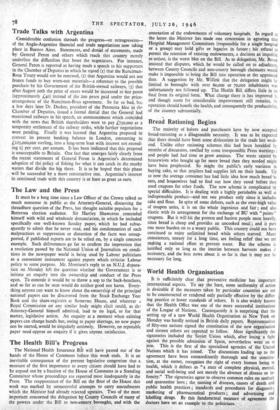The Law and the Press
It must be a long time since a Law Officer of the Crown talked so much nonsense in public as the Attorney-General, discussing the threadbare question of the Press, has thought suitable papulum for a Battersea election audience. Sir Hartley Shawcross, contended himself with wild and wholesale denunciation, in which he included specifically one well-known Sunday paper, which he had subse- quently to admit that he never read, and his condemnation of such malpractices as suppression or distortion of the facts was unsup- ported, if published reports are to be relied on, by a single concrete example. Such deliverances go far to confirm the impression that a resolution passed by the National Union of Journalists on condi- tions in the newspaper world is being used by Labour politicians as a convenient instrument against papers which criticise Labour policy to some purpose. Mr. Morrison's reply to an N.U.J. deputa- tion on Monday left the question whether the Government is to initiate an enquiry into the ownership and conduct of the Press open. To concede it would be to throw a sop to the back-benchers, and so far as can be seen would do neither good nor harm. Every- thing anyone can want to know about the ownership of the principal national papers can be discovered from the Stock Exchange Year Book and the share-registers at Somerset House, and whatever a Royal Commission on any similar body might elicit could, as the Attorney-General himself admitted, lead to no legal, or for that matter, legislative action. An enquiry at a moment when existing papers can change hands but, owing to paper shortage, no new paper can be started, would be singularly untimely. However, no reputable paper need oppose an enquiry if it gives anyone satisfaction.






























 Previous page
Previous page